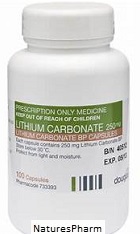What is Lithium?
Basically, lithium is taken to treat bipolar or manic-depressive disorder, and it works by stabilizing people’s mood and decreasing extremities in behaviors by restoring the right balance of specific neurotransmitters. There are many benefits of this treatment, including reducing the number of manic episodes and their symptoms, such as irritability, loud and fast speech, anxiousness, aggressive behaviors and others. Sometimes Lithium is prescribed by doctors to prevent cluster headaches, too.
This medication should be taken 3-4 times a day with or right after meals to reduce the possibility of having stomach ulcers. It’s also necessary to drink 8-12 glasses of liquid on a daily basis and stick to a healthy diet with enough sodium when undergoing this kind of treatment. Patients should remember that a lot of salt in their daily diet may alter their Lithium blood levels. When it comes to the right Lithium dosage, it’s based on different factors, such as current lithium blood levels, specific medical conditions, etc. Usually, it takes around 1-3 weeks to notice improvements in health condition.
For all people, it’s essential to have the right Lithium amount in their bodies because too much of it may result in such unwanted side effects as diarrhea, nausea, dizziness, seizures, confusion and others. However, there is only some small difference between too much Lithium and its correct amount, and that’s why doctors need to closely monitor their patients and keep the necessary lab and other appointments while taking this medication.
There are certain medication that may affect the right removal of Lithium from the body and its functions. For example, they include ARBs, ACE inhibitors, NSAIDs, diuretics and other pills taken to treat mood or mental conditions. Patients also need to stick to their normal diet with the right amount of salt and inform their physicians about the drugs that they are using to avoid risky drug combinations.
Like other meds, Lithium may result in certain side effects, including tiredness, dizziness, drowsiness, weight gain, fine tremors, increased thirst, frequent urination and others. The great news is that they are rare, mild and go away once their bodies adjust to this medicine. In very rare cases patients may develop such symptoms as fever, vomiting, unsteady walk, diarrhea, slurred speech, vision changes, confusion, hand trembling, seizures, cold hands, muscle weakness, joint pain and serious allergic reactions. The latter ones are characterized by difficulty breathing swelling, itching and rash.
Recommendations for Use
Precautions and Contraindications
Before starting this treatment, patients need to inform their physicians about possible allergic reactions and other medical complications, including heart problems, urinary and kidney issues, seizures, hypothyroidism, leukemia, dehydration, fever, skin disorders, etc. In some cases the intake of Lithium reveals the existing medical condition that affects heart beats and develops the so-called Brugada syndrome characterized by such serious symptoms as fainting, dizziness, difficulty breathing and so on.
Moreover, there are certain risk factors that should be considered before patients start taking Lithium, such as unexplained fainting, heart issues and Brudaga syndrome. This medicine can make them feel drowsy or dizzy in addition to resulting in certain vision changes, so that it’s not advisable to drive or perform other activities that requite full attentiveness.
Drug Interactions
Side Effects


